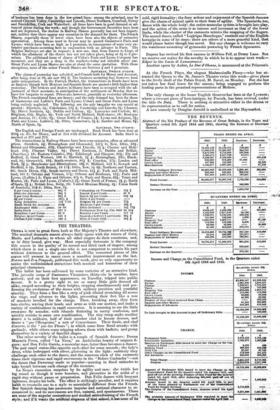THE THEATRES.
OPERA is now in great force, both at Her Majesty's Theatre and elsewhere. The musical dramatic season always fairly opens with the return of Grisi, Mario, and Lablache; to whom all other singers do their courtesies, and, as in' duty bound, give way. Most especially fortunate is the company this season in the quality of its second and third rank of singers; among which there is not a single the who is not competent to sustain his part without detriment . to the general effect. The concerted pieces of this season will present in many cases a manifest improvement on the last. Norma and Dm Pasquale' performed this week, give us only opportunity to notice the undiminished attractions both musical and humorous of their principal characters.
The ballet has been enlivened by some varieties of an attractive kind. The juvenile corps of Danseuses Viennoises, thirty-six in number, have arrived; and on their first appearance, on Tuesday, tripped into public favour. It is a pretty sight to see so many little girls dressed all alike, ranged according to their heights, stepping simultaneously and per- forming the evolutions of the dance with military precision and youthful alacrity. They form a line like a strip of pink riband stretching all across the stage, and advance to the lights, presenting their feet like a row of muskets levelled for the charge. Then, breaking away, they form into circles, waving their heads and arms as with one motion, and make a variety of combinations in rapid succession. It is amusing to see the little creatures fly asunder, with ribands fluttering in merry confusion, and quickly reunite in some new combination. The tiny troop make another entrée a la militaire, half of their number clad in hussar dresses, and dance a "pas l'Hongroise," a sort of Cracovienne. Their finale, and chef d'oeuvre, is the " pas des Fleurs "; in which some form floral arcades with garlands, while others come tripping adown them with baskets, and group themselves in a variety of fanciful shapes. The other novelty of the ballet is a couple of Spanish dancers: Donna Manuals, Peres, called " La Nena," an Andalusian beauty of mignon fi- gure; and Don Felix Garcia, a muscular man, fatter than becomes a dancer. The pair stand statue-like opposite each other for some seconds; the lady's dress, white bedropped with silver, glistening in the light: suddenly they challenge each other to the dance, and the sonorous click of the castanets times their vigorous and rapid movements in the "Bolero Cachucha"-not the dance that Duvernay made so popular-pausing in fixed attitudes to take breath between each change of the measure.
La Nena's execution, surprises by its agility and ease: she twirls her leg round as though it were boneless, and pirouettes in the midst of a rapid step without pause or preparation. Don Felix dances with buoyant lightness, despite his bulk. The effect is strikingly peculiar, and it requires habit to reconcile one to a style so essentially different from the French. But Spanish dancing has passionate impulse and national eharacter to re- commend it; and its movements are free, natural, and spontaneous. There are none of the angular' contortions and studied attitudinizing of the French style; and if it wants the artificial elegance of that school, it has none of its
cold, rigid formality: the fiery ardour and enjoyment of the Spanish dancers give the charm of animal spirit to their feats of agility. The Spaniards, too, dance with the whole body: the entire muscular system is brought into play, and the action of the arms is as intense and incessant as that of the lower limbs, while the chatter of the castanets mimics the snapping of the fingers. The second dance, called " Legirigas Manchegas," reminds one of the English hornpipe in some of its steps: there are others of a more graceful kind, that would please better though less novel. But any change is welcome to.vary the wearisome monotony of gymnastic posturing by French figurantes.


























 Previous page
Previous page